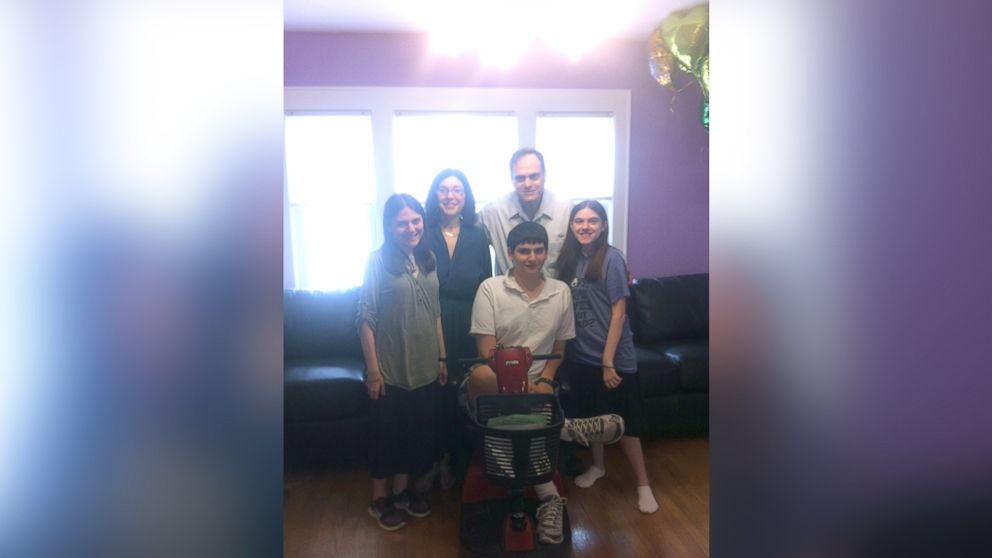Family Struggles to Find Diagnosis After All Four Children Develop Mysterious Muscle-Wasting Condition
All four children suffer from a mysterious disease.

— -- The first sign something was wrong with the Herzfeld children was when 9-year-old Tziporah started to fall over her own feet.
The girl's mother, Esther Herzfeld, said she remembered thinking, "She’s wearing shoes that are too big for her."
But then a concerned teacher pulled Herzfeld aside and said Tziporah was falling in gym class, "And there’s no reason for her to be falling."
The family went through years of seeing specialists trying to find an answer but Tziporah Herzfeld, now 22, didn't test positive for any disorder. Doctors initially suspected she might have Charcot-Marie-Tooth (CMT) but the girl tested negative for all known variants of that genetic disease.
Esther Herzfeld first shared her story this year so the family could win a wheelchair-accessible van. Though the family didn't win, community benefactors stepped in to help the family. Her goal now is to share her family's story in the hopes a doctor or researcher can help identify her children’s illness.
Charcot-Marie-Tooth disease is a group of progressive disorders that can lead to muscle wasting and difficulty walking. In rare cases it can be fatal.
Years after Tziporah Herzfeld developed difficulty walking, her brother Tzvi started tripping over tree branches and cobblestones. A former swimmer and athlete as a younger child, Tzvi used to be sure of himself as he scaled up the kitchen door for fun.
"He rode horses and he rode a bicycle the way Evel Knievel rode motorcycles," Esther Herzfeld remembered of her only son.
She said her son's deterioration was more pronounced. While he could walk home on the last day of eighth-grade, on the first day of school months later he showed up in a wheel chair. He can no longer stand for more than a few seconds and uses a stair lift to go up and down floors.
'I threw up in the middle of the street. I was absolutely sick to my stomach.'
The oldest child in the family, Rivka, didn't develop symptoms till after high school when on a trip to Israel she was unable to complete a mountain walk. Esther Herzfeld said she knew her youngest daughter, Racheli, had symptoms when she had to hoist herself into the school bus at age 5.
It was the exact same way Tziporah had gotten onto the school bus years earlier.
"I literally got nauseated," Esther Herzfeld recalled. "I threw up in the middle of the street. I was absolutely sick to my stomach."
In spite of years of meeting with doctors, all four children have seen some deterioration and none have been definitively diagnosed, said Esther Herzfeld. Currently they are thought to have CMT due to their symptoms but none have been definitely diagnosed with the disease, meaning they cannot take part in experimental treatments for that disease.
"Three out of four kids have different surgeries to repair things, to keep degeneration at bay a little bit," said Esther Herzfeld. "They haven’t really ... worked out too well."
The family's oldest daughter Rivka, 23, recently underwent extensive genetic testing along with her parents at the Hackensack University Medical Center. Doctors tested for 50,000 gene abnormalities that would be a signal she had a disorder, but nothing was found. More in-depth testing is underway.
"The deeper he goes into the testing process the fewer people have it and the less likelihood," there's treatment, Rivka's mother said. "That’s even more disheartening than it already is."
'I’m still praying for a miracle that this might be found, treated, reversed.'
Jehannine Austin, a genetic counselor for the National Society of Genetic Counselors, said there are "thousands" of rare diseases that are incredibly difficult to diagnose.
"They’re an enormous challenge," said Austin. "There are thousands and thousands of genetic conditions. ... If you take all the rare disease like this and put them together, 1 in 12 people are affected by this."
Austin said that without a diagnosis families can feel "terror" since they don't know how their child's health will deteriorate and are left without the ability to contact other patients or families, who have been through similar ordeals.
"There’s a perception out there that genetic testing is going to have all of the answers," Austin said. "Because of this rare disease issue. If they don’t have a genetic variant that has been previously described, then we don’t know how to interpret the testing that we do."
Esther Herzfeld said now she hopes that if her children are definitively diagnosed they can take part in experimental treatments and possibly be cured.
"I’m still praying for a miracle that this might be found, treated, reversed," said Herzfeld. "The only reason I agreed to go public at all was this hope that there’s a doctor out there ... who said 'Wow I’m working on some sort of clinical trial related to this.'"



